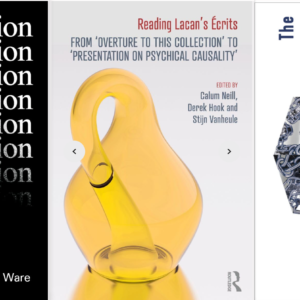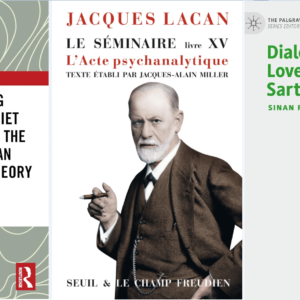News – October 2018
The 2019 Lacan’s Écrits Conference has been announced for 11th-13th October 2019 at Duquesne University, Pittsburgh. Organized by the Duquesne Psychology Department, it follows the first Lacan’s Écrits Conference which took place in Ghent in September. A call for papers has been issued with the following details:
Papers with a maximum length of 2000 words can be presented (15-20 minutes) and discussed. We invite papers focusing on:
- Specific conceptual topics and texts from the Écrits
- The clinical use of ideas from the Écrits
- Themes from the Écrits in relation to philosophy, history, arts, literature, gender studies, psychology, politics, psychosocial studies, etc.
Paper submissions (WORD format) should be between 450 and 500 words. Your submission should make clear the basic points you will discuss as well as provide an overview of your overall line of argument. The first page of your submission should include your name, the submission title, institutional affiliation, phone and email. The second page of the submission should include your title and the 450-500 word proposal.
Panel submissions (WORD format) should contain all individual paper submissions in addition to an overall description of aims and thematic concerns of the panel. Submissions should also mention the panel chair (name, institutional affiliation, phone and email). Panels should be made up of between 3 and 4 papers, and should take no longer than 80 minutes (in total) to present.
Proposals for papers and panels should be submitted by April 1st, 2019, and will be peer reviewed. Acceptance will be announced by May 1st, 2019.
Please send your proposals to: LacanConference2019@hotmail.com – mentioning ‘Paper Proposal 2019 Lacan Ecrits Conference’ or ‘Panel Proposal 2019 Lacan Ecrits Conference’ in the subject box.
The second installment of the three-volume Routledge commentary series Reading Lacan’s Écrits will be launched at the conference. This book, Reading Lacan’s Écrits: From to ‘On a Purpose’ to ‘Comments on Daniel Lagache’ (edited by Derek Hook, Calum Neill and Stijn Vanheule), will be available at a reduced rate to conference delegates. The organising committee is Yael Baldwin, Dan Collins, Bruce Fink, Derek Hook, Michael Miller, Calum Neill, Stephanie Swales and Stijn Vanheule.
A call for papers has also gone out for contributions to a new collection on Lacanian and Foucaultian approaches to the body. Professor Becky McLaughlin at the University of South Alabama, and Professor Eric Daffron at Ramapo College in New Jersey, are inviting essay contributions that examine the ways that Lacan and Foucault took the body as an object of critical enquiry but explored it in divergent ways. Full details of submission criteria and possible topics can be found here.
To mark the centenary of Armistice Day, there will be a shared reading of Freud’s essay ‘Thoughts for the Times on War and Death’ and his exchange of letters with Albert Einstein, ‘Why War’, at the Freud Museum London on Remembrance Sunday, 11th November. A range of analysts and scholars will conduct the readings, which will be followed by conversation and refreshments. Full details on the Freud Museum’s site.
The Toronto Psychoanalytic Society & Institute will be running a course throughout November and December on ‘Clinical Lacan: The Apple of My ‘I’’. Leaders will present the underlying theory and related techniques of the Lacanian orientation as they are used in their various clinical settings. The topics will focus on the body, the ego, and the sinthome as they occur in the early, late, and contemporary Lacan. Full schedule and details of how to register are here.
Among the new publications, as originally announced a few months ago the translation of Colette Soler’s Lacan Reading Joyce is now available, courtesy of the Centre for Freudian Analysis and Research Library and publishers Routledge. It introduces Soler’s influential reading of Lacan’s famous Seminar on Joyce, The Sinthome (1975-76), and its origins in Lacan’s earlier work in such as ‘The Agency of the Letter in the Unconscious’ (1956). Soler herself began practicing and teaching psychoanalysis in the year of Lacan’s seminar on Joyce after having been in analysis with Lacan, and she continues to do so as part of the organisation she founded, the School of the Forums of the Lacanian Field.
Published within the last month is a new volume, Psychoanalysis and the GlObal, edited by Ilan Kapoor, which takes a Lacanian approach to globalisation. The “hole at the heart of the ‘glObal’”, with reference to the book’s title, refers to the way the contributors use the Lacanian concept of the Real to assess what they refer to as the “rifts, gaps, exceptions, and contradictions” of the sociopolitical problems that characterise our times. As Lacan once said, the unconscious is political, and the authors attempt to show how the unconscious itself is traversed by social and political antagonisms.
Also newly-published as part of the Palgrave Lacan Series is Raul Moncayo’s Knowing, Not-Knowing, and Jouissance: Levels, Symbols, and Codes of Experience in Psychoanalysis. A supervising analyst at The Lacanian School of Psychoanalysis, USA, Moncayo’s book includes an analysis and commentary on several of Lacan’s texts, including the little-studied but notoriously difficult L’Etourdit from 1972.
Announced last month for publication in February next year is Decolonial Psychoanalysis: Towards Critical Islamophobia Studies by Robert Beshara. It explores the possibility of a genuinely anti-colonial psychology, drawing on postcolonial and decolonial approaches to Islamophobia and Lacanian Discourse Analysis, in particular the Zizekian critique of ideology. It is available to preorder from publishers Routledge or Amazon.
For French speakers, due to be released later this month is Laurie Laufer’s Lettres à Lacan which brings together letters from psychoanalysts, artists, scientists, and philosophers within and outside France to consider Lacan’s effect on psychoanalysis and its teaching. It is available through Kindle via the link above for those outside France.
The excellent UIT Books in New York is offering up to 50% off all books for the next few days until the US midterm elections. UIT publishes new translations of work by Lacan’s contemporaries, followers, and later critics, including J.-B. Pontalis, Jean Laplanche, and Dominique Scarfone. No discount code is needed, but hurry as the offer ends soon.
The sixth issue of The Lacanian Review is due for release mid-November. Its title, Urgent!, is the theme of next year’s NLS Congress taking place in Tel Aviv in June. With a series of new translations of texts by Lacan and Jacques-Alain Miller, the focus is on the real unconscious and the last phase of Lacan’s teaching. President of the NLS Bernard Seynhaeve curates the contents, with translations by Russell Grigg. Four lessons from Miller’s seminar Lacanian Orientation frame the issue. Subscribe or buy here.
In a new paper for Frontiers in Psychology, Stijn Vanheule, Nienke Moernaut and Jasper Feyaerts examine how patients experience hallucinations in a qualitative study building on interviews. Their research demonstrates that hallucinatory contents are not random but are about existential issues embedded in a life narrative. ‘Content Matters, a Qualitative Analysis of Verbal Hallucinations’, is available to download for free.
Finally, The New Polis carries a short interview from October with Lacanian analyst Thomas Svolos based on his 2017 book Twenty-First Century Psychoanalysis in which he looks at the development of the Lacanian orientation in the United States and its future. In this interview Svolos talks about why he chose to become a Lacanian psychoanalyst, the interface between Lacanianism and politics, and Jacques-Alain Miller’s reference to the ‘soapbox’ of the symptom (Svolos’ translation of the French escabeau, used by Lacan in reference to Joyce).
Got news? Get in touch.




Leave a Reply